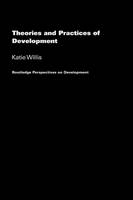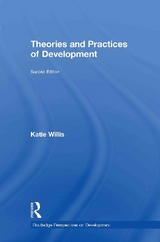
Theories and Practices of Development
Seiten
2005
Routledge (Verlag)
978-0-415-30052-0 (ISBN)
Routledge (Verlag)
978-0-415-30052-0 (ISBN)
- Titel erscheint in neuer Auflage
- Artikel merken
Zu diesem Artikel existiert eine Nachauflage
This introductory text explains and places in a historical context, the development theories behind contemporary debates, such as globalisation and transnationalism.
Throughout the twentieth century, governments sought to achieve 'development' not only in their own countries, but also in other regions of the world; particularly in Africa, Asia, Latin America and the Caribbean. This focus on 'development' as a goal has continued into the twenty-first century, for example through the United Nations Millennium Development Targets.
While development is often viewed as something very positive, it is also very important to consider the possible detrimental effects it may have on the natural environment, different social groups and on the cohesion and stability of societies.
In this important book, Katie Willis investigates and places in a historical context, the development theories behind contemporary debates such as globalization and transnationalism. The main definitions of 'development' and 'development theory' are outlined with a description and explanation of how approaches have changed over time. The differing explanations of inequalities in development, both spatially and socially, and the reasoning behind different development policies are also considered. By drawing on pre-twentieth century European development theories and examining current policies in Europe and the USA, the book not only stresses commonalities in development theorizing over time and space, but also the importance of context in theory construction.
This topical book provides an ideal introduction to development theories for students in geography, development studies, area studies, anthropology and sociology. It contains student-friendly features, including boxed case studies with examples, definitions, summary sections, suggestions for further reading, discussion questions and website information.
Throughout the twentieth century, governments sought to achieve 'development' not only in their own countries, but also in other regions of the world; particularly in Africa, Asia, Latin America and the Caribbean. This focus on 'development' as a goal has continued into the twenty-first century, for example through the United Nations Millennium Development Targets.
While development is often viewed as something very positive, it is also very important to consider the possible detrimental effects it may have on the natural environment, different social groups and on the cohesion and stability of societies.
In this important book, Katie Willis investigates and places in a historical context, the development theories behind contemporary debates such as globalization and transnationalism. The main definitions of 'development' and 'development theory' are outlined with a description and explanation of how approaches have changed over time. The differing explanations of inequalities in development, both spatially and socially, and the reasoning behind different development policies are also considered. By drawing on pre-twentieth century European development theories and examining current policies in Europe and the USA, the book not only stresses commonalities in development theorizing over time and space, but also the importance of context in theory construction.
This topical book provides an ideal introduction to development theories for students in geography, development studies, area studies, anthropology and sociology. It contains student-friendly features, including boxed case studies with examples, definitions, summary sections, suggestions for further reading, discussion questions and website information.
Katie Willis is Senior Lecturer in Geography at Royal Holloway, University of London. Her main research interests are gender and development, transnationalism and migration. She has conducted in Mexico, California, Singapore, China and the UK. She is editor of International Development Planning Review and has published widely in geography and development-related journals.
1. Introduction: What Do We Mean by Development? 2. Classical and Neo-Liberal Development Theories 3. Structuralism, Neo-Marxism and Socialism 4. Grassroots Development 5. Social and Cultural Dimensions of Development 6. Environment and Development Theory 7. Globalization and Development: Problems and Solutions? 8. Conclusions
| Erscheint lt. Verlag | 3.3.2005 |
|---|---|
| Reihe/Serie | Routledge Perspectives on Development |
| Zusatzinfo | 23 Line drawings, black and white; 24 Halftones, black and white; 29 Tables, black and white; 27 Illustrations, black and white |
| Verlagsort | London |
| Sprache | englisch |
| Maße | 156 x 234 mm |
| Gewicht | 567 g |
| Themenwelt | Naturwissenschaften ► Geowissenschaften ► Geografie / Kartografie |
| ISBN-10 | 0-415-30052-5 / 0415300525 |
| ISBN-13 | 978-0-415-30052-0 / 9780415300520 |
| Zustand | Neuware |
| Haben Sie eine Frage zum Produkt? |
Mehr entdecken
aus dem Bereich
aus dem Bereich
über eine faszinierende Welt zwischen Wasser und Land und warum sie …
Buch | Hardcover (2023)
dtv (Verlag)
CHF 33,55
Buch | Hardcover (2024)
Schweizerbart'sche, E. (Verlag)
CHF 33,55
Eine Einführung in die spezielle Mineralogie, Petrologie und …
Buch | Hardcover (2022)
Springer Spektrum (Verlag)
CHF 83,95



